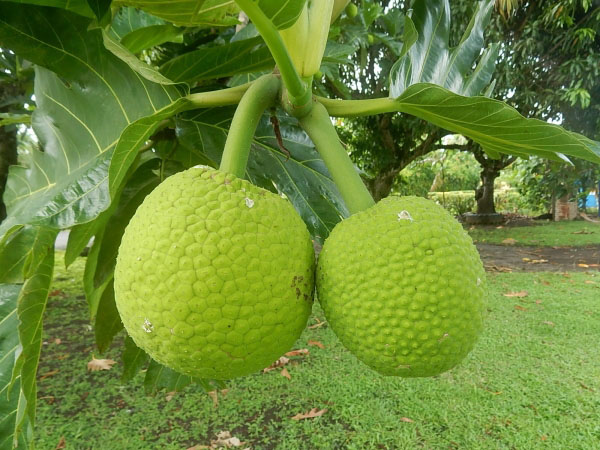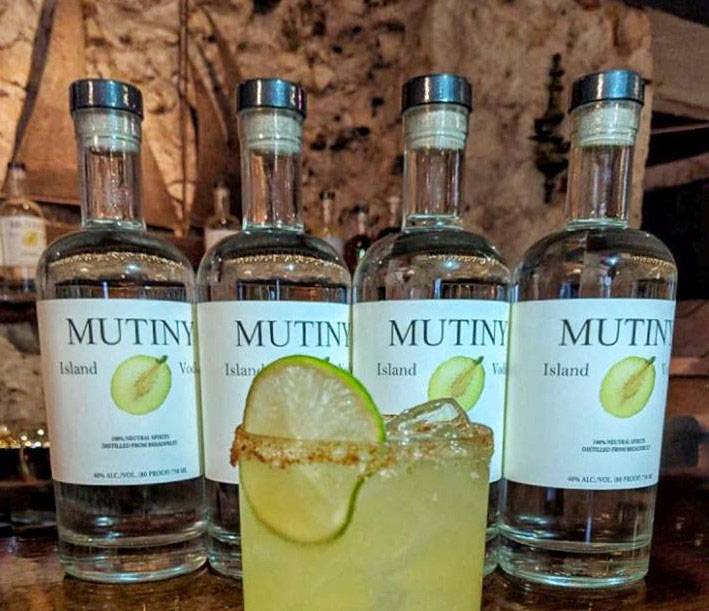It may not yet be rated amongst the world’s ‘blue ribbon’ vodkas, but the Mutiny Island Vodka has created a sufficiently robust regional stir to possibly increased demand for breadfruit, widely believed to be an untapped superfood. It may be tasty, filling, loved across the Caribbean and versatile in terms of the things it can do but here in Guyana it has ranked, up until relatively recently, among the most wasted fruit. Indeed, while these days, a breadfruit fetches a fair price in the markets, it still drops from trees and rots in many places.
On the Caribbean island of St. Croix – one of the U.S Virgin Islands – however, the advent and the fair success of Mutiny Island Vodka, a creation of an American named Todd Manley, who now lives in St. Croix, has presented breadfruit in a new light and Guyana may well be tempted to begin to pay attention not just to the export potential which Mutiny Island Vodka might have opened up but also the various other ways in which the versatility of the fruit can be exploited.

This, of course, is not to say that Guyana must now rush off into breadfruit-flavoured vodka production as a means of rolling back the local spoilage of fruit. However, it certainly raises the question as to whether the advent of Mutiny Island vodka may not create an opening for our breadfruit exports. Arising out of the commercial success of Mutiny Island vodka, commercial interest in the highly nutritious fruit has reportedly been growing across the Virgin Islands. Besides Mutiny Island, interest in breadfruit is also driven by the increasing global demand for gluten-free foods.
Both in Guyana and elsewhere breadfruit’s nutritional and cultural importance has been recognised for millennia. Considered a staple in many parts of the region breadfruit is, in some territories often consumed even more frequently than rice.
What particularly makes breadfruit appealing is the range of value-added food products to which it can contribute, including pastas, chips and baking mixes. Breadfruit can also be used in the manufacture of cosmetics and insect repellent. Indeed, the edible and nonedible uses of breadfruit are reportedly steadily finding their way to the global market. Against this backdrop the question certainly arises as to whether it isn’t high time that our nutritionists and agricultural, agro-processing and nutrition sectors begin, finally, to put heads together to find ways of maximising our returns (in terms of both local and export markets) from the significant volumes of breadfruit grown locally.
The significance of the breadfruit reposes in the fact that that there exists a Global Breadfruit Heritage Council (GBHC) and that even now, traditional farmers and farmer organisations have launched initiatives to regenerate agricultural systems in which breadfruit can thrive.
Not that Guyana has been altogether indifferent to the value of breadfruit. Around mid-last year, Dr Oudho Homenauth, Chief Executive Officer of the National Agricultural Research and Extension Institute (NAREI) announced that Guyana was moving to significantly increase its breadfruit cultivation and that 30 acres of land in Regions Four, Five, Seven, and Ten had been targeted for breadfruit cultivation within the next two years.
The pace of progress of that project is unclear. Back in 2015 President David Granger had himself publicly pronounced on the importance of breadfruit during an event to mark National tree-planting day. NAREI has itself been the recipient of thousands of breadfruit seedlings from the GBHC over the years some of which have been distributed to farmers.






